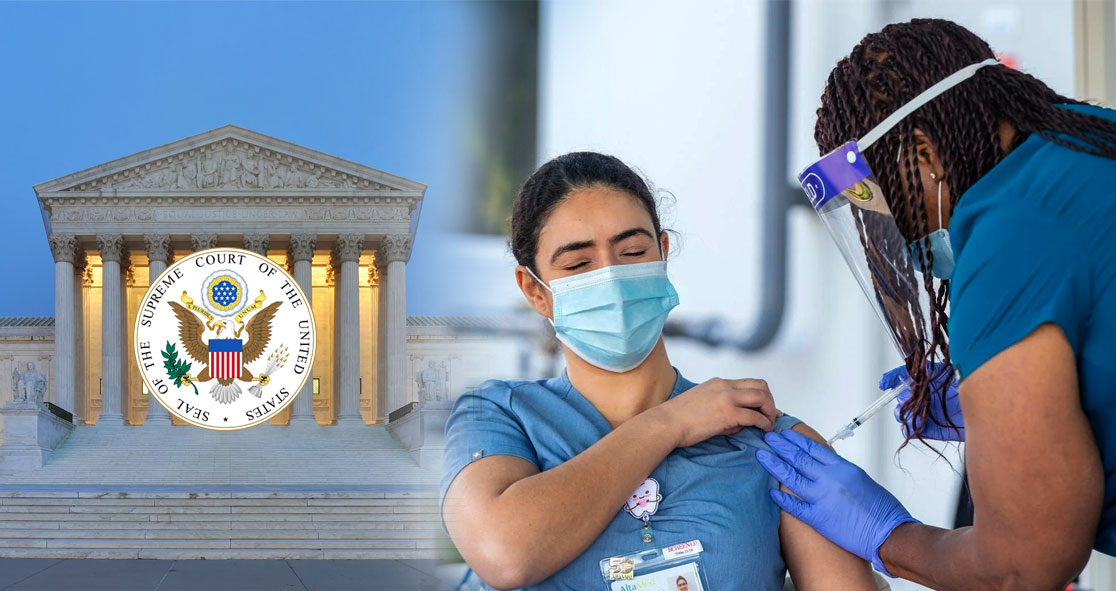On Thursday, the Supreme Court ruled that the federal government can enforce a final rule mandating health workers to be vaccinated against COVID-19.
The Supreme Court agreed that the final rule mandating the vaccine for medical workers in facilities participating in Medicare and Medicaid “fits neatly within” the authority Congress has granted to HHS to impose conditions on federal funds, according to Revcycle Intelligence, a news outlet.
An opinion released along with the SC decision stated, “After all, ensuring that providers take steps to avoid transmitting a dangerous virus to their patients is consistent with the fundamental principle of the medical profession: first, do no harm. It would be the ‘very opposite of efficient and effective administration for a facility that is supposed to make people well to make them sick with COVID–19.’”
According to the original final rule, health workers are required to have at least their first jab by December 6, 2021, and be fully vaccinated by January 4, 2022, unless they had medical or religious reasons for exemption.
HHS said the rule would affect more than 10 million people working in hospitals and other healthcare settings.
The federal health department suspended enforcement of the vaccine mandate for health workers in light of the court decisions. However, it later reinstated the mandate in all states not involved in the cases.
HHS also updated compliance deadlines, requiring Medicare and Medicaid facilities to have their staff members vaccinated with the first shot by January 27, 2022. They must be up to date on their COVID-19 immunization by February 28, 2022.
The American Hospital Association (AHA) said it would work with hospitals to comply with the vaccine mandate.
AHA President and CEO Rick Pollack said, “Now that the Supreme Court ruling has lifted the ban on the CMS vaccine mandate, the AHA will work with the hospital field to find ways to comply that balances that requirement with the need to retain a sufficient workforce to meet the needs of their patients.”
“We urge any [health] providers that are not subject to the CMS requirement to continue their efforts to achieve high levels of vaccination,” he added. “We must continue to work together as a field to use vaccines as the powerful tool that they are to protect everyone in our communities.”
The American Medical Association (AMA) said in a statement, “While the AMA) is pleased by today’s opinion allowing the Center for Medicare and Medicaid’s (CMS) interim rule requiring COVID-19 vaccines for health care workers to take effect, we are deeply disappointed that the Court blocked the Occupational Safety and Health Administration’s (OSHA) emergency temporary standard for COVID-19 vaccination and testing for large businesses from moving forward.”
“Workplace transmission has been a major factor in the spread of COVID-19,” the statement added. “Now more than ever, workers in all settings across the country need commonsense, evidence-based protections against COVID-19 infection, hospitalization, and death — particularly those who are immunocompromised or cannot get vaccinated due to a medical condition.”
“In fact, recent data released by United Airlines shows that before their own vaccine requirement went into effect, on average, more than one United employee was dying each week from the virus; however, today, none of their vaccinated workers are currently hospitalized with COVID-19 despite breakthrough infections and 3,000 current positive employees,” the AMA said.
The association has urged large employers “to do their part to safeguard their workforces and communities so we can defeat this COVID-19 pandemic together.” The article was published in Revcycle Intelligence.























